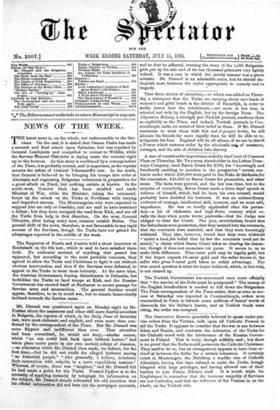Mr. Disraeli was questioned again on Monday night by Mr.
Forster about the massacres and other still more fearful atrocities in Bulgaria, the reports of which, in the Daily News of Saturday last, were most elaborate and explicit, and even more than con- firmed by the correspondent of the Times. But Mr. Disraeli was more flippant and indifferent than ever. That atrocities had been committed, he would not deny,—similar scenes, which " no one could look back upon without horror," had taken place under panic in our own ancient colony of Jamaica, —an admission which Mr. Disraeli then made, we believe, for the first time,—but he did not credit the alleged tortures among " an historical people," " who generally, I believe, terminate their connection with culprits in a more expeditious manner." Whereat, of course, there was "laughter," and Mr. Disraeli felt he had made a point for the Turks. Pressed further as to the necessity of applying instantly by telegraph for information on the subject, Mr. Disraeli simply reiterated his old assertion that his official information did not bear out the newspaper accounts, and to that he adhered, treating the story of the 1,000 Bulgarian girls put up for sale and of the ten thousand prisoners very lightly indeed. It was a case in which the jaunty manner was a grave mistake. Mr. Disraeli is an admirable actor, but he should dis- tinguish more between the styles appropriate to comedy and to tragedy.






























